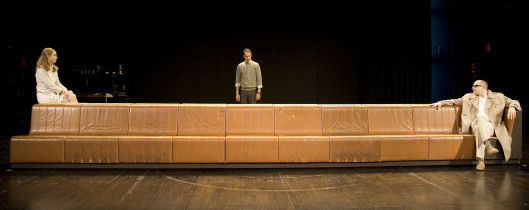This content is for our members. Please consider becoming a member. If you are already a member, please log in for access.
Volume 30
Editor’s Column
This content is for our members. Please consider becoming a member. If you are already a member, please log in for access.
Stage: John Gabriel Borkman (Dublin)
In a new version by Frank McGuinness
Abbey Theatre; Dublin; October 6 — November 20, 2010
John Gabriel Borkman premiered in Ireland on the occasion of the centenary of Ibsen’s birth—in April 1928. “[I]t was hard to reconcile oneself,’ wrote the drama reviewer of the Evening Herald on that occasion, “that Ibsen in these countries is not popular in the ordinary … meaning of the term” (J.W.Good, April 4, 1928). “But that night was an exception. Warmed up by the presence of the Norwegian dignitaries, and charmed by the professionalism of the Abbey actors, the public let go of their grudges and applauded loudly.” Suddenly, noted the reviewer with just a hint of irony, “Ibsen was popular.”
This content is for our members. Please consider becoming a member. If you are already a member, please log in for access.
Stage: John Gabriel Borkman (Berkeley)
Aurora Theatre Company; Berkeley; April 2—May 9, 2010
The surge in recent productions of John Gabriel Borkman, which is all out of proportion to the play’s previously scant production track record, is of course mostly due to its sudden relevance in the wake of the global financial crises and scandals of the past decade. As yet another Ibsen play offers up a ready-made hook for today’s audiences, one does in fact have to admire Ibsen’s skill in identifying topics that constantly reactivate as “hot” and “contemporary” more than one hundred years later.
This content is for our members. Please consider becoming a member. If you are already a member, please log in for access.
Stage: John Gabriel Borkman (Commonweal)
13th Annual Ibsen Festival
Commonweal Theatre; Lanesboro, Minnesota; April 9 – June 11, 2010
As usual, the week-end-long Ibsen Festival in Lanesboro, founded by the Commonweal Theatre, was a whirlwind of activity. In addition to music, dance, and Norwegian folk-art demonstrations offered by different community groups, the Theatre had its own usual program of extra-dramatic offerings to accompany its Ibsen production.
This content is for our members. Please consider becoming a member. If you are already a member, please log in for access.
Stage: The Master Builder (NYC)
The Resonance Ensemble/Harold Clurman Theatre; New York City; May 9 – June 5, 2010
The Resonance Ensemble, founded in 2001, offers an unusual and stimulating repertory season each year, consisting of a classic play in repertory with a new play inspired by it, as for example the 2007 repertory of Chekhov’s The Cherry Orchard paired with Arthur Giron’s The Coffee Trees, a variation on Chekhov’s themes set in contemporary Guatemala. The 2010 repertory departs somewhat from this practice by pairing The Master Builder with a play not inspired by it, but with a similar theme, June Finfer’s The Glass House, a portrayal of the real-life architect Mies van der Rohe late in his career as he struggles to maintain his position and power.
This content is for our members. Please consider becoming a member. If you are already a member, please log in for access.
Stage: Rosmersholm (NYC)
The Pearl Theatre; New York City; November 12 – December 19, 2010
One of the most remarkable things about the dramas of Ibsen’s middle period is the way that, to a much greater extent than any other Western dramatist with a strong interest in social questions, the plays continue to resonate powerfully more than a century after their creation. I was struck last season, during our ongoing political and economic crisis, at how immediately relevant were Dr. Stockmann’s misgivings about the majority and their easy manipulation by the media and by demagogic politicians.
This content is for our members. Please consider becoming a member. If you are already a member, please log in for access.
Stage: An Enemy of the People (NYC)
Adapted by Seth Barrish and K. Lorrel Manning
The Barrow Group; New York City; February 6 – March 8, 2010
Shaw once famously pontificated on the transitory nature of the problems in Ibsen’s social dramas, claiming that “A Doll’s House will be flat as dishwater when A Midsummer Night’s Dream will still be fresh as paint.” This observation has not proven among Shaw’s more accurate prognostications. Today, more than a century later, we still find Ibsen’s social dramas as disturbingly relevant to current social and political concerns as the morning headlines. This has often struck me in attending revivals of these plays, but perhaps never more powerfully than in the new adaptation of Enemy by the Barrow Group.
This content is for our members. Please consider becoming a member. If you are already a member, please log in for access.
Stage: An Enemy of the People (Aquila)
Aquila Theatre/Skirball Center; New York University; March 30, 2010
Founded in 1991 in the UK by Peter Meineck, the Aquila Theatre calls itself “dedicated to the reinterpretation of classical [sic] drama.” It is based at New York University’s Center for Ancient Studies and presents several plays annually at NYU and at other academic venues in the city. Its main activity, however, is touring; it visits about 70 U.S. towns and cities a year.
This content is for our members. Please consider becoming a member. If you are already a member, please log in for access.
Stage: Ghosts (London)
Duchess Theatre; London; February 23 – March 27, 2010
After seeing this seemingly aimless production, I took up the program to look for some statement of directorial intention. But the “Henrik Ibsen said this” and “Henrik Ibsen did that” of the program text, presented through a series of quotes and anecdotes, in which the director of the present production was absent, was fit for Cliffs Notes. This reinscription of what might be called (with a hint of melancholy) “Ibsen the classic” perfectly reflected director Iain Glen’s production (in Frank McGuinness’ serviceable translation), which fell tediously short of the complexity of Ibsen’s play.
This content is for our members. Please consider becoming a member. If you are already a member, please log in for access.
Stage: Maison de Poupée (Paris)
Théâtre de la Madeleine; Paris; February 16 – May 27, 2010
Michel Fau’s Maison de Poupée – Ibsen’s A Doll House in Terje Sinding’s widely used French translation – deliberately made use of exaggeration and melodrama, yet managed to render the story of Nora’s realization convincingly. Purportedly guided by the well-known Ibsenism, “Life is not sad—life is ridiculous—and that’s what makes it unbearable,” the production was witty and captivating, both because of and despite its courting of the absurd.
This content is for our members. Please consider becoming a member. If you are already a member, please log in for access.
Stage: Solness le Constructeur (Paris)
Théâtre Hébertot; Paris; September 3 – November 27, 2010
The Théâtre Hébertot, a Louis-Philippe jewel built in 1836 in the village of Batignolles, now part of Paris’ 17th arrondissement, has a long and partly illustrious history. Until the end of the nineteenth century, the gilded, galleried house known as “les Batnigolles” alternated melodramas and the kind of comedies that, in the words of its current Artistic Director Pierre Franck “made nobody laugh except imbeciles” (L’avant-scène théâter [August, 2010] 95). The philanthropist Jacques Rouché changed all this when he transformed the Hébertot into a theatre for serious French drama.
This content is for our members. Please consider becoming a member. If you are already a member, please log in for access.
Book Review: Henrik Ibsens skrifter
Henrik Ibsens skrifter. Ed. Vidgis Ystad et. al.
Oslo: Aschehoug, 2006--. 31 volumes. 891 kr. per volume.
(En electronic version also exists.)
This new edition of the collected works of Ibsen is intended to replace the old Centennial Edition (Hundreårsutgaven, 1928-1957), which is much in need of updating. New letters have surfaced; Ibsen’s nineteenth-century Dano-Norwegian often requires some elucidation; and the editorial commentary in any collected works should reflect the best of recent scholarship. Of the planned thirty-one volumes of the complete Skrifter, twenty-four are now available.
This content is for our members. Please consider becoming a member. If you are already a member, please log in for access.
Survey of Articles 2009
Survey of Articles on Ibsen: 2009
Editor’s Note: This survey systematically reviews articles in refereed journals whose language is English. Articles in refereed journals in other languages may also be included. Collections of articles, conference proceedings, and festschrifts may also be reviewed or noted.
This content is for our members. Please consider becoming a member. If you are already a member, please log in for access.

